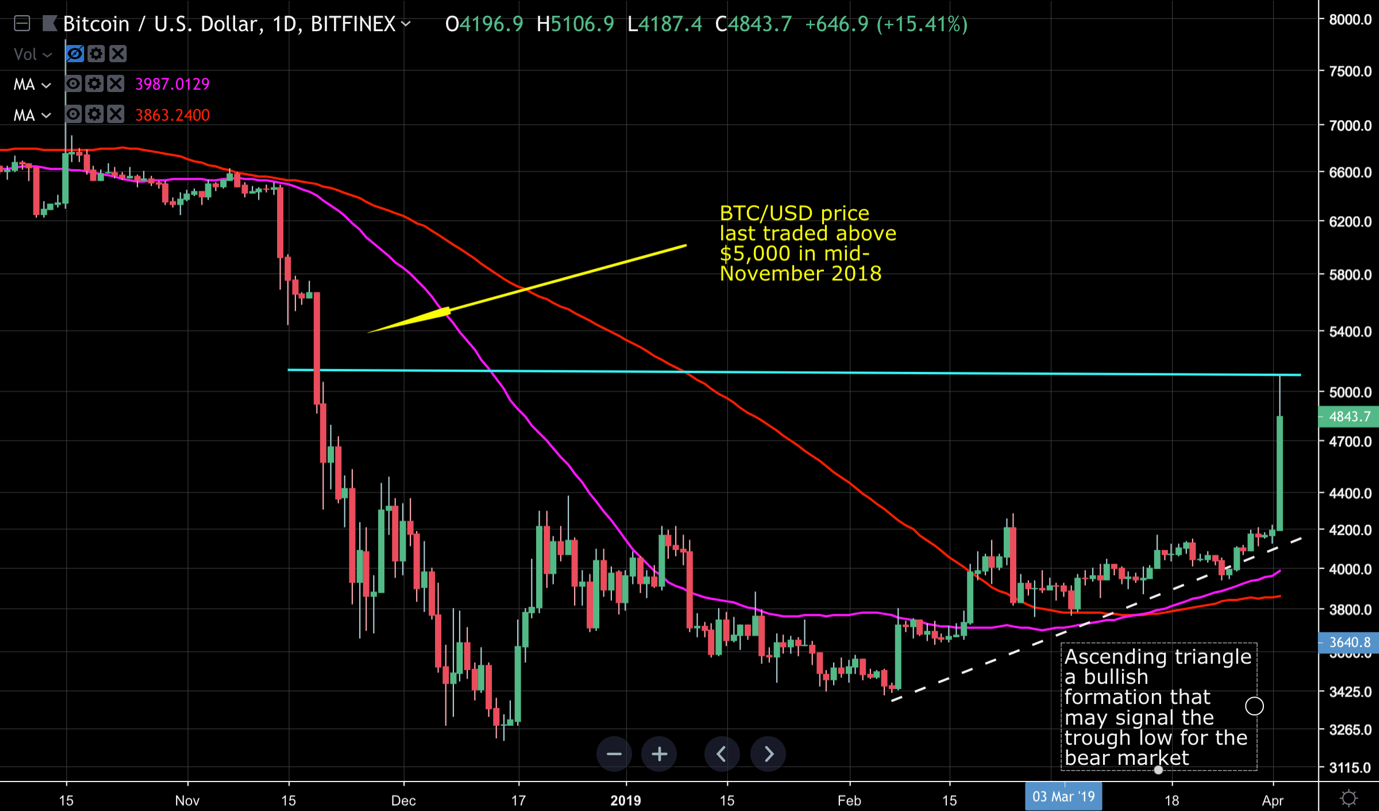Bitcoin rallies quickly to 2019 high
Our award-winning writer has the news and explains why there's fresh interest in the cryptocurrency.
2nd April 2019 13:21
by Gary McFarlane from interactive investor
Our award-winning writer has all the news and explains why there's fresh interest in the cryptocurrency.

Bitcoin has just seen a huge breakout after weeks of sideways trading, briefly touching $5,000. This is the first time that price level has been hit since November last year.
Although bitcoin fell back, it is currently trading at $4,843 on Bitfinex, according to TradingView for a 15% gain so far today (Tuesday 2 April).
On Monday, as bitcoin was closing in $4,200 on strong daily volume of $10 billion, the possibility of a decisive move higher was in play.
Trading volume has strengthened considerably in the past 24 hours and there may be a further spurt as US trading takes hold.
Current reported bitcoin daily volume on coinmarketcap is $14 billion, although not all of that figure can necessarily be verified as genuine trading activity.
That came on the back of bitcoin hitting a welcome data point last week when it registered the lowest monthly price volatility ever recorded. That was taken by some as a prelude to a bullish reversal.

(1-day chart BTC/USD on Bitfinex. Source: TradingView)
Record low bitcoin price volatility… until today
Dow Jones Market Data published figures showing that March price volatility level of 7.8% was the lowest since it began collating the data in October 2013.
Since early February bitcoin has formed an ascending triangle of higher lows on the 1-day chart, which will please the bulls and perhaps signals a market bottom.
The top cryptocurrency had failed to breach $4,200 this year, until today. Liquidation of short positions at that level may well have added fuel to the fire.
On a technical view, although there was some minor resistance expected at $4,500, there was not much in the way of other hurdles to surmount in a climb to $5,000, as the spike confirms.
Whether or not this apparent bullish trend reversal marks the end of the so-called "crypto winter" will depend on the reclaiming of $5,000 in short order.
April Fool!
A fly in the ointment for those drawing bullish conclusions is the theory circulating in the market that two erroneous stories may have triggered the advance.
First, there was the unfounded story that the People's Bank of China, as part of a strategy to diversify its dollar foreign exchange reserves, was starting to add bitcoin to its holdings.
A second unrelated story (it was April Fool's Day yesterday) claimed that the US Securities and Exchange Commission had approved two bitcoin exchange traded funds (ETFs).
The source for the ETF rumour was a story published by the news outlet Finance Magnates. Buyers in Asia may have been taken in.
Finance Magnates only later added a disclaimer to the headline, making explicit the fact that it was an April's Fool story.
Given the reaction, at least in Asia, to the "fake news", it may nevertheless confirm that sentiment is shifting towards a surer footing.
Alternatively, it could turn out to be a near-term bear trap if the pull-back sees the price fall below $4,500.
Another consideration to throw into the mix to help explain the dramatic bullish breakout is the more positive bearing of global equities markets. This may have helped to bring out crypto buyers, despite the lack of correlation between the two more generally.
Suffice to say the rest of the crypto market is following in bitcoin's wake, with Cardano, Tron, Monero and Litecoin all up more than 10%.
Overall crypto market capitalisation has risen to $160 billion.
Weiss Ratings sees crypto network fundamentals improving
Last week Weiss Ratings, the US equities ratings firm that now produces ratings for 122 cryptocurrencies, released a report in which EOS, Ripple's XRP, bitcoin and Binance, in that order, came top of the pile with the highest overall rating, all receiving a B-.
Weiss judges the various crypto projects on their technology, adoption and risk-reward potential.
Although Weiss emphasises the high-risk nature of investments in the sector, it pointed to the improvement in network fundamentals for a host of leading cryptoassets.
Measured by daily transaction volume, EOS, WAX, Tron, Bitshares, Steem, Kin, Ethereum, XRP, bitcoin and Waves are the 10 leaders.
Looking at the bitcoin and Ethereum numbers, between February 2018 and March 2019 transactions per day improved from 191,984 to 332,153 for the former but fell from 813,603 to 557,925 for Ethereum.
Ethereum has been underperforming the rest of the market due to its perceived lack of progress in upgrading its software to improve throughput.
New-generation blockchain platforms are increasingly attracting decentralised app developers, with EOS and Tron doing well. This is because of their use of so-called delegated proof-of-stake protocols for verifying transactions, which is much more scalable than bitcoin and Ethereum's current proof-of-work system.
The Weiss cryptocurrency outlook report, entitled Dark Shadows With A Bright Future, stated: "The industry's network capacity and security have improved dramatically. And the underlying technology has evolved with new, more efficient ways to create digital assets."
It continued: "This combination of lower prices and improved fundamentals offers new
opportunities for investors, provided they can afford the risk, avoid the worst and invest in the best."
As far as tech/adoption goes, EOS, XRP and bitcoin are all graded A, with Ethereum in fourth slot on A- because despite its scaling issues it is still the number one smart contract platform.
China crypto ratings latest demotes bitcoin again
The semi-official China crypto trading from the China Electronic Information Industry Development (CCID), came out last week and saw bitcoin continue to slip down the ranking, from 13th to 15th place.
The top three coins are EOS, Tron and Ethereum. Bitcoin scores low on the three ranking criteria of basic tech, applicability and creativity.
Despite criticism from some quarters about the security implications of delegated proof-of-stake systems, which rely on a handful of super nodes as opposed to bitcoin's more decentralised network, China clearly has a preference for smart contract networks that are currently able to scale for real-world consumer and enterprise deployment.
Coinbase has just introduced a new staking service for institutions. A number of platforms pay interest to stakers.
The US exchange will take on the custody risk on behalf of institutional investors for a fee, with earnings of 6.6% expected, according to the firm.
The first network being offered is Tezos (XTZ).
The Economist says bitcoin is bust
The China rankings assessment didn't go down well in the crypto community but writers at The Economist may be inclined to agree.
An unnamed author at the reputable weekly, penned a piece headlined Flaws in Bitcoin Make a Lasting Revival Unlikely. The writer sees bitcoin's poor adoption, lack of scalability and susceptibility to fraud because of irreversible transactions, as together being its Achilles Heel.
Referring to the thoughts of computer scientist Nicholas Weaver of University of California, Berkeley, The Economist states: "Mr Weaver is sceptical, at least in the short term. The very visible boom and bust, and more attention from regulators, have probably cut the number of willing new punters, he says."
Going by the price take-off seen in the past 24 hours, that may prove to be a badly timed article.
Latest updates from Bakkt shows focus on price discovery
Citing the walk back on bitcoin futures by derivatives trading venue the Chicago Board Options Exchange, The Economist also highlights the failure of crypto trading desks to materialise at the Barclays and Goldman Sachs as indicative of what it presumably sees as the continuing failure of crypto to attract institutional fund flows.
However, other evidence points to the opposite, as we have reported this year.
The latest in that department comes in an update from the Bakkt offering from the Intercontinental Exchange, the owners of the NYSE, in a post by chief executive Kelly Loeffler confirming that the platform is on-track as it continues to work with US regulators.
Kelly noted: "Our planned Bakkt bitcoin futures contracts will be listed and cleared on CFTC-regulated exchange and clearing infrastructure, ICE Futures US and ICE Clear US, where global market participants already transact."
There is still no launch date, but Kelly suggests the robustness of their platform will be a corrective to the worst practices of the marketplace by providing reliable and trusted price discovery: "The price discovery function in these new physical delivery markets should contribute to building confidence in bitcoin prices."
Bithumb hacked again, India coindelta closes
And if a reminder were needed that crypto is yet to fully emerge from its Wild West roots, South Korea's Bithumb exchange was hacked, again, to the tune of $13 million worth of EOS tokens.
CoinDesk Korea says an insider is suspected of orchestrating the theft.
Elsewhere, in India crypto traders and investors using the services of Coindelta woke up to the shock news on 30 March that it was closing down its operation, citing "regulatory restrictions".
India has banned banks from using crypto and having any dealing with crypto companies.
Coindelta co-founder Shubham Yadav, explaining the exchange's action, said: "We have been operating at a minimal trade fee, bearing all the costs ourselves ensuring that your trading experience remains unaffected in the current unregulated environment. Economically, it's no longer viable to continue with the exchange."
But other Indian exchanges continue to operate normally and suspicions about Coindelta's move were raised after it hiked withdrawal fees by five to six times, according to complaints from customers.
Rival exchange WazirX has offered to reimburse the Coindelta fees for investors who transfer their funds to its exchange.
However, that offer only applies to transfers of 25K INR ($361) or more. Also, the crypto has to be held in the account for at least 10 days before the reimbursement takes place.
The largest exchange in India by volume, CoinDCX, with Bain Capital Ventures among its backers, in a statement sent to interactive investor said that along with having the lowest fees in the Indian market, it has "now decided to waive off the fee on major assets like Ripple (XRP), Tron (TRX) and Stellar (XLM) completely for all the users irrespective of the asset value."
In a swipe at Coindelta, the CoinDCX statement read: "We seriously condemn the move made by CoinDelta, by hiking withdrawal fee, creating FUD [fear, uncertainty and doubt] and mistrust in the Indian Cryptocurrency ecosystem."
CoinDCX chief executive Sumit Gupta added: "CoinDCX understands the need for an imminent increase in market surveillance which is why the exchange chooses to operate with sheer transparency and would adopt only a plan that would be beneficial in the long run for everyone."
These articles are provided for information purposes only. Occasionally, an opinion about whether to buy or sell a specific investment may be provided by third parties. The content is not intended to be a personal recommendation to buy or sell any financial instrument or product, or to adopt any investment strategy as it is not provided based on an assessment of your investing knowledge and experience, your financial situation or your investment objectives. The value of your investments, and the income derived from them, may go down as well as up. You may not get back all the money that you invest. The investments referred to in this article may not be suitable for all investors, and if in doubt, an investor should seek advice from a qualified investment adviser.
Full performance can be found on the company or index summary page on the interactive investor website. Simply click on the company's or index name highlighted in the article.